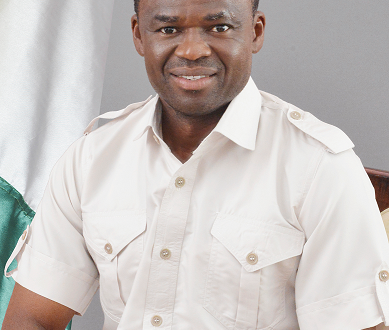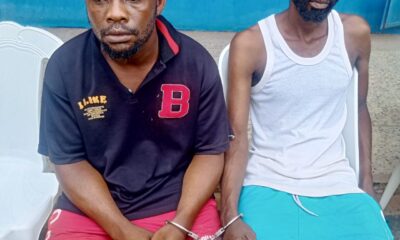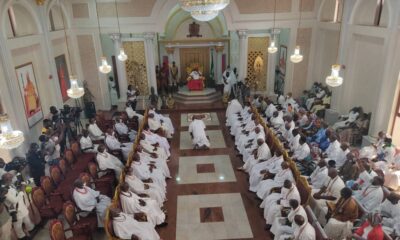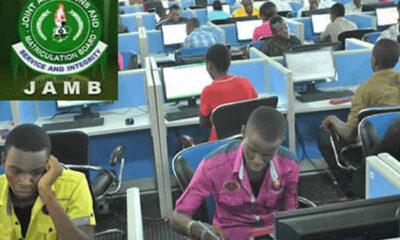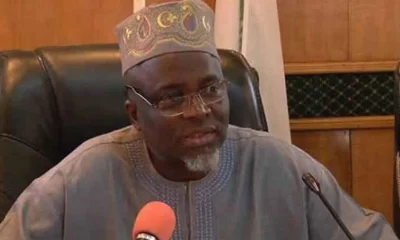Headline
Pele Fans Search Brazilian Football Legend’s Hometown For Souvenirs
Published
1 year agoon
By
Editor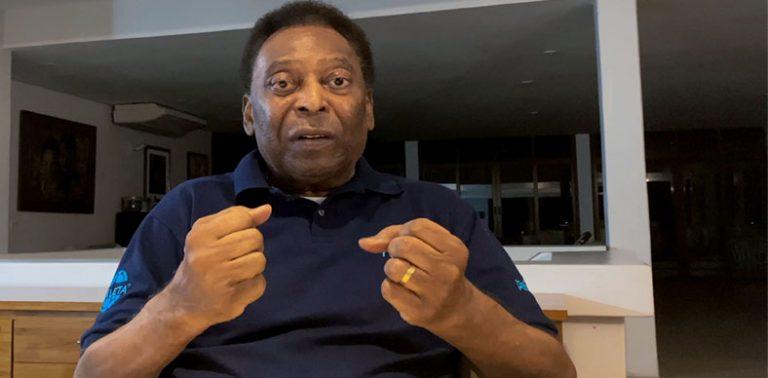
The deteriorating health and eventual death of sports legend Pele has rekindled curiosity about the quiet town of Tres Coracoes in southeastern Brazil, where the football prodigy was born 82 years ago.
Fans seeking rare mementos of the Brazilian star are scouring the town of 75,000 inhabitants where Pele was born to a poor family and spent the first years of his life.
A month ago, Pele was admitted to Albert Einstein Hospital in Sao Paulo, where he had been undergoing treatment for colon cancer since late 2021.
Eight days ago, the hospital announced Pele’s cancer was showing “progression” and he needed “more extensive care to treat kidney and heart failure.”
READ ALSO: BREAKING: Football Legend Pele Is Dead
Tres Coracoes, which means “three hearts” in Portuguese, is located some 250 kilometers (150 miles) from Brazil’s three major metropolises: Belo Horizonte, Sao Paulo and Rio de Janeiro.
The small town is surrounded by coffee plantations and is famous for just one thing: the birth, in 1940, of Edson Arantes do Nascimento, known as Pele.
Pele moved away from Tres Coracoes at a young age before joining his longtime club, Santos FC, as a teenager.
Santos, a port city near Sao Paulo, now hosts the Pele Museum, where most of his trophies and other memorabilia are displayed.
The football star’s declining health has drawn fans to the museum and to Tres Coracoes, where they can visit Pele House — a replica of his first home.
“I had never been to this house, which is already ten years old,” said Neilor Henrique, who lives nearby.
“But the news of his hospitalization made me want to visit it,” the 41-year-old told AFP.
Built based on the memories of Pele’s mother, Celeste Arantes do Nascimento, now 100 years old, the house shows the family’s modest origins, with a few pieces of wooden furniture, straw mattresses, an old radio and a framed portrait of his parents on one wall.
– Immense statue –
A few meters (yards) away, the small museum Terra do Rei (Land of the King) exhibits Santos jerseys signed by Pele, a football he played with and his birth certificate.
But some fans say they wished Tres Coracoes had more mementos of the man dubbed “The King.”
Rafael Antunes took a detour during a family trip to visit the town in search of Pele souvenirs.
READ ALSO: OPINION: Pele Can’t Untie Messi’s Shoelace (1)
“I found few traces of him in the town, almost none,” said the 43-year-old entrepreneur, unimpressed by the huge statue of Pele that stands at the entrance to the town.
“I think it shows a certain lack of respect for the role he played for football and our country,” he said of the only player to ever win the World Cup three times.
But Fernando Ortiz, a family friend, has a different reasoning for why there aren’t more monuments to Pele.
“Many Brazilians can’t stand to see their compatriots succeed. And when it’s a black Brazilian, the dismissal is even stronger,” said the 60-year-old, who spearheaded the construction of Pele House.
“Unfortunately, I think that if Pele had been a white man with light eyes, he would have been accepted by everyone.”
You may like


Secret Daughter Of Football Legend, Pele Named In His Will


Guardiola Includes Pele Among Six ‘Eternal’ Talents Of Football [Full list]


Brazil Declares Three-day National Mourning For Pele


13 Things To Know About Late Football Legend Pele


Pele ‘Immortal’, Greatest Player Of 20th Century, Says Football’s Ruling Body FIFA


Pele’s Burial Arrangements Rolled Out, Body To Be Taken To His 100-year-old Mother
Headline
PICTORIAL: C&S Church Ayo Ni O Installs New Leader
Published
13 hours agoon
May 2, 2024By
Editor
The Cherubim and Seraphim (S&S) Movement Church Worldwide, on Wednesday, formally installed Prophet Emmanuel Alogbo as the 6th Baba Aladura and spiritual head of the church.
Alogbo was appointed the acting spiritual head in November 2023 following the death of his predecessor, Samuel Abidoye, who died on November 12, at the age of 103.
A statement published on the official website of the church reads, “The ascension of Most Senior Special Prophet Dr. Emmanuel Abiodun Alogbo to the revered position of Spiritual Father and Chairman of the Cherubim and Seraphim Movement Church signifies a pivotal moment in the history of the church, ushering in a new era of leadership and guidance for its global congregation.”
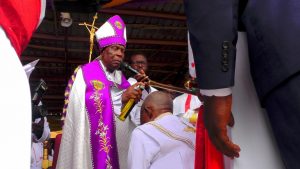
READ ALSO: Officer Who Shot Man Dead During Fuel Queue Tumult Identified — Lagos Police
Alogbo’s installation was reported to have been attended by important figures in the church, “including the Olori of Cherubim and Seraphim Unification, His Most Eminence Pro. Dr. S. A. Alao J.Pil., who performed the anointment, which added to the solemnity and grandeur of the occasion.”
Alao was said to have charged the new Baba Aladura to embrace his role with strength and courage.
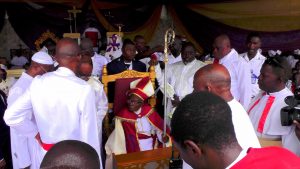
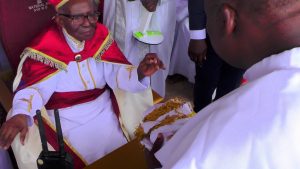
Congregants were also said to have recognised Alogbo as an embodiment of divine wisdom, compassion, and spiritual insight.
In his pledge to the CSMC Worldwide, the new Baba Adura was quoted assaying, “I solemnly pledge to continue the good work of moving our beloved church forward, which the late Baba Aladura Prophet Samuel Adefila Abidoye started.
“It is my firm commitment to ensure that the C&S Movement Church continues to march on, spreading its message of faith and love to all corners of the globe.”
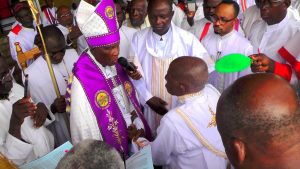
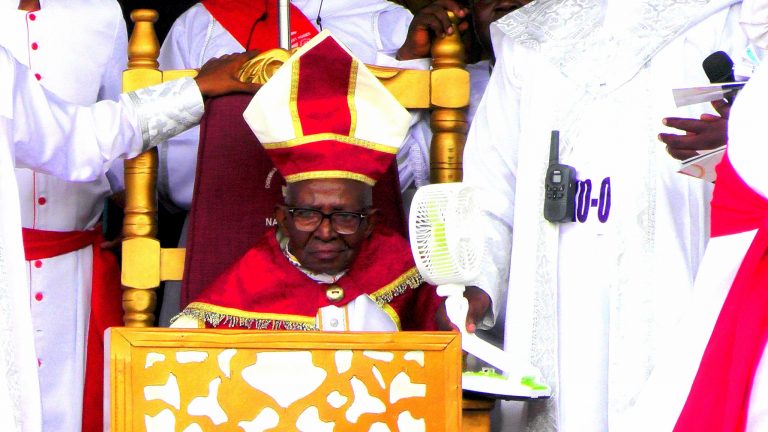
Headline
Nigerian Man Extradited From Malaysia, Convicted For $6.3m Fraud In US
Published
15 hours agoon
May 2, 2024By
Editor
A federal jury in New Haven, Connecticut, Wednesday, convicted an extradited Nigerian national, Okechukwu Osuji, for engaging in a business email compromise scheme out of multiple countries, including the United States.
This was revealed in a statement by the US Department of Justice on Thursday, saying that Osuji and his accomplices, John Wamuigah and Tolulope Bodunde defrauded their victims of over $6.3 million.
The jury convicted Osuji of conspiracy to commit wire fraud, wire fraud, and aggravated identity theft.
Principal Deputy Assistant Attorney General Nicole M. Argentieri, head of the Justice Department’s Criminal Division, said, “Osuji led a network of scammers in Malaysia and elsewhere in a sophisticated business email compromise scheme to defraud victims of millions of dollars.”
READ ALSO: Nigerian Sues Malaysia Govt N406m For Unlawful Detention
“Today’s conviction is another example of how the department’s collaboration with international law enforcement partners enables us to bring cybercriminals to justice in the United States.”
US Attorney Vanessa Roberts Avery for the District of Connecticut added, “While it is often difficult to identify and bring to justice cybercriminals operating overseas, today’s verdict demonstrates the expertise of the FBI and Stamford Police in uncovering this criminal network, and the shared commitment of our counterparts in Malaysia to ensure that fraudsters are held accountable in a court of law.
“We will continue to work to root out those who engage in internet fraud schemes, no matter where in the world they operate, and achieve justice for victims of these crimes.”
“The defendant perpetrated a complex international business email compromise scheme and laundered millions in stolen proceeds,” said Executive Assistant Director Timothy R. Langan Jr. of the FBI’s Criminal, Cyber, Response, and Services Branch.
READ ALSO: EFCC Arraigns Nigerian Who Posed As Woman To Dupe Malaysian
“This conviction is the result of hard work and close collaboration between the FBI and our local and international partners. Together, we will work aggressively to bring to justice anyone who engages in fraud and theft against Americans, no matter where they are in the world.”
“Today’s verdict provides a bit of closure to some victims of these often financially crippling crimes,” said Special Agent in Charge Robert Fuller of the FBI New Haven Field Office.
“It also displays our international ability to bring criminal actors to justice despite the complexities of their crimes. We want to thank all of our law enforcement partners here and abroad, as well as the U.S. Attorney’s office, for their dedication to serving justice.”
READ ALSO: Naira Abuse: EFCC, Cubana Chief Priest To Settle Out Of Court
Osuji who was deported by Osuji is slated to be sentenced on July 24 and faces a mandatory minimum of two years on the identity theft count and a maximum penalty of 60 years in prison on the wire fraud and conspiracy counts.
A Federal District Court judge will determine any sentence after considering the US Sentencing Guidelines and other statutory factors.
Osuji was arrested in Malaysia and extradited to the US in 2022. His alleged co-conspirator, Wamuigah, remains in Malaysia and is pending extradition proceedings, while another co-conspirator, Bodunde, pleaded guilty on February 16.
Headline
How Two Kenyan School Dropouts Made Prosthetic Arms For People With Disabilities
Published
23 hours agoon
May 2, 2024By
Editor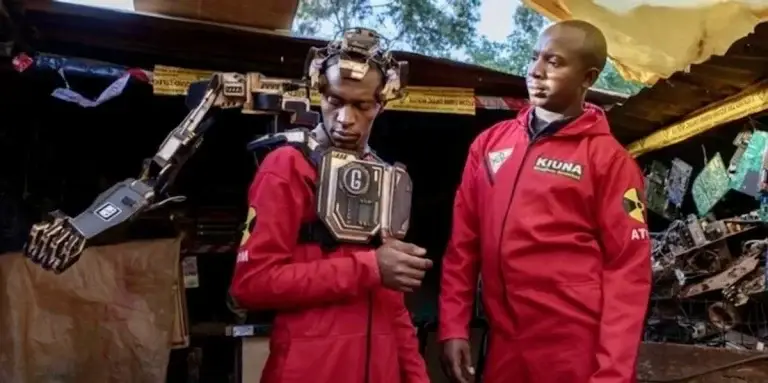
Two young Kenyan inventors have invented bio-robotic prosthetic arms from waste materials to help improve the lives of the physically challenged people in 2021.
Both David Gathu and Moses Kiuna were at the age of 29 when they designed a bio-robotic prosthetic arm in helping the people that have lost their limbs.
Recounting their ordeal before venturing into the invention, the duo said they were forced to drop out of college because of the expensive school fees but did not let the challenges steal their vision.
Gathu and Kiuna accomplished their dream to help their communities in a workshop in Kiambu county in Kikuyu, Kenya, north of the capital Nairobi.
READ ALSO: 14-year-old Boy Killed In London Sword Attack
According to Face to Face Africa, the workshop was basically a shed made out of worn-out rusted iron sheets standing next to a chicken coop.
The floor was covered with gravel, making the ground outside the shop and the interior all but indistinguishable, as brown broken glass with tape all around fits the window frame.
Brain signal bio-robotic arm
Another significant thing about the invention was being the world’s first bio-robotic arm operated by brain signals. The invention, which is controlled by brain signals, has been billed as a game-changer in the lives of disabled people in Kenya.
Gathu and Kinyua’s invention was unique and different from most prosthetic technology which is powered by a person’s muscles.
READ ALSO: Woman Reveals Secret To Longevity As She Celebrates 106th Birthday
The arm works by converting brain signals into an electric current by a “NeuroNode” biopotential headset receiver. NeuroNode biopotential was originally invented to help people suffering from paralysis and speech loss.
Also, the inventors narrated that the idea to develop an electronic prosthetic came to them during the pandemic as part of their contribution towards assisting Kenya to battle the pandemic. It was initially created to help COVID-19 sanitisation efforts.
“When the virus hit our country, we decided to create a machine that could help us decontaminate surfaces. It can also be used in schools, restaurants, hospitals,” Shoppe Black quotes Kinyua as saying.
Using waste products
According to a report by Anadolu Agency, the Kenyan inventors solved two problems with their innovations, first, by using waste products to make the environment clean and safe, and helping a community of people living with disabilities.
READ ALSO: Popular Iraqi TikToker Umm Fahad Gunned Down Outside Baghdad Home
“People throw away a lot of things that are harmful to the environment just because they don’t work. If they don’t work, it might be just one component that’s faulty but all the other components still work and can be recycled,” Gathu said.
“We’ve recycled everything that you see here. They throw it away, we pick it up and use it. This has saved us from spending a lot of money because we’re not backed up financially by anyone to come up with our innovations.”
They picked up “junk” that people threw away – things like plastic, rubber, wiring, old computer motherboards, LED lights, USB devices, switches, optical drives, heat sinks, fans, and power supply units – components that they say could be quite expensive to purchase from a shop.
Helping the community
READ ALSO: UK-based Nigerian Doctor Loses Licences Over Sex For Free Botox Injections
Speaking about the physically challenged people, he said, “The main reason we came up with this is to help people in our community who have lost their limbs. We don’t want these people to feel like they can’t do anything, we want them to be dependent on themselves.”
The arm can do many more tasks. They say they are still perfecting their device, but lack of funds has been a challenge.
David Mathenge from the Association for the Physically Disabled of Kenya (APDK), a charity NGO, says: “Such inventions are the future of the science of artificial limbs. This is the science we need to ease the challenges people with disabilities face.”

15-year-Old Public School Student Scores 362 In UTME

Group Mulls Legal Option To Stop IOCs’ Divestment From N’Delta

OPINION: National Amnesia Whitewashes The White Lion
Trending

 Politics2 days ago
Politics2 days agoWhy Candidate Who Needs Interpreter Can’t Be Edo Gov – Shaibu

 Metro5 days ago
Metro5 days agoEdo Police Arrest Suspected Cultists Who Allegedly Killed Rival In His Daughter’s Presence

 Business3 days ago
Business3 days agoCustomers Panic As CBN Bans Opay, Palmpay, Others’ New Accounts

 News5 days ago
News5 days agoJUST IN: Popular Gospel Singer Is Dead

 News4 days ago
News4 days agoOoni: Suspended Benin Palace Functionaries Banished

 News2 days ago
News2 days agoEx-policeman Who filmed Wife Having Wex With Her Superior Found Guilty Of Stalking

 News3 days ago
News3 days agoJUST IN: FG Approves Salary Increase For Civil Servants

 News4 days ago
News4 days agoBREAKING: JAMB Releases 2024 UTME Results

 News4 days ago
News4 days ago2024 UTME: JAMB Withholds Results Of 64,624 Candidates

 Metro5 days ago
Metro5 days agoGunmen Assassinate Governor Aiyedatiwa’s Campaign Coordinator In Ondo














